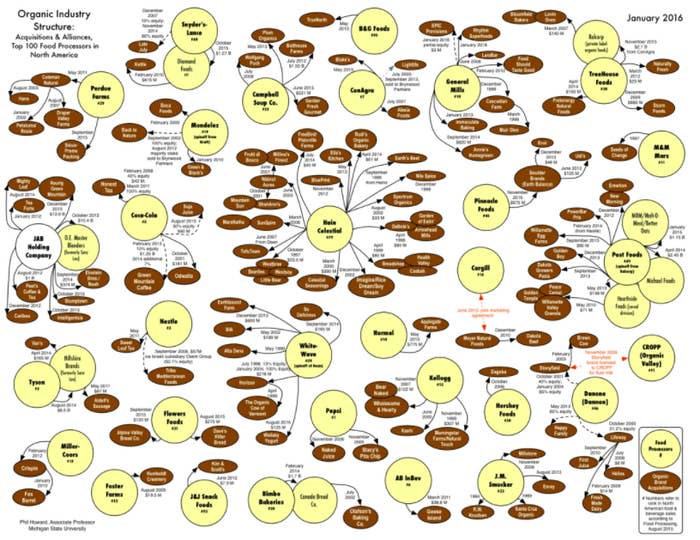
If it wasn't apparent that organic food had gone corporate, the sirens clearly sounded this year when the retail behemoth Amazon acquired Whole Foods, which itself had already become an icon of corporatized natural food.
The acquisitions of companies in the organic food business "took off in the '90s but now involve bigger and bigger companies," said Philip Howard, a professor at Michigan State University, who has tracked the consolidation of the industry over the decades.
In 2017, it's rare to find a well-known natural food brand that isn't owned by a huge corporation. J.M. Smucker acquired Santa Cruz Organic in 1989. General Mills bought Cascadian Farm in 1999. In 2011, Coca-Cola bought Honest Tea. And if PepsiCo buying a kombucha maker in 2016 wasn't enough, this past April, the French multinational food company Danone completed its acquisition of the vey company that popularized soy milk with Americans, WhiteWave Foods, aka the maker of Silk milks.
"It is without a doubt a different world," said Tim Sperry, a consultant to organic products companies who has worked in the industry since the 1970s, including several years at Whole Foods.
If the global takeover of soy milk didn't signal the end for the hippies, Whole Foods selling itself to Amazon almost certainly does. And it's just one of several changes shaking up the organic food business as we know it.
Who owns whom

Organic food proponents "had a mission: that Americans would eat better food, would know where it came from, how it was grown, they’d have some assurances of quality food," Sperry said. "We succeeded, big time. More than any of us could have ever imagined." Now, as the folks who kicked off the movement decades ago approach retirement age, "It’s time for us to turn things over to a different [age] group," he said.
For better or worse, Amazon's purchase of Whole Foods means it is now a major player in the organic foods movement.
In truth, Whole Foods was never the brainchild of a stereotypical hippie, crunchy as its tofu ginger rice muffins and kale bouquets may be. The grocer was cofounded in 1980 by John Mackey, an anti-union libertarian who in 2012 voted for Mitt Romney. While Mackey may have a strong counterculture streak, do yoga, and eat vegan, his book Conscious Capitalism also celebrates the "heroic story of free-enterprise capitalism" while asking business leaders to find a higher purpose.
Over the decades, the consciously capitalistic grocer, which went public in 1992, expanded by acquiring local natural foods stores — the kind of activity that opens opportunities for some workers and displaces others. Later mocked as "Whole Paycheck" for its high prices, it eventually became associated more closely with yuppies than with hippies. Perhaps it was fated to join forces with a shrewd business like Amazon.
Whole Foods — despite its position on unions and some complaints that its wages are too low — has made Fortune's list of best employers for two decades straight. Workers are eligible for benefits if they work at least 20 hours per week. Fortune wrote this year, "'Respect' is one of the 'key ingredients' at this famously green grocery chain, which makes employees 'feel welcome,' 'appreciates' their contributions, and pays staffers in stores 'fairly' with gain sharing and bonuses when they come in under budget on labor costs."
Any of this could change under Amazon, whose "bruising workplace" was detailed in a New York Times article. According to former and current employees who spoke to the Times, Amazon's corporate employees battling health problems are put on performance improvement plans, it isn't unusual to see colleagues cry at their desks, and hostile language is a feature of the workplace. (Amazon criticized the Times' portrayal.) Other reporting has also described difficult working conditions at the company's warehouses. The automation-friendly retailer hasn't commented on future employment plans, but it said no layoffs would result from its merger with Whole Foods.
Aside from possible changes to Whole Foods' corporate ethos, Amazon has clear ambitions for food retail, and one area of focus will be lowering Whole Foods' famous prices.
In a statement, Whole Foods said, "Amazon and Whole Foods Market are working together to pursue the vision of making Whole Foods Market’s high-quality, natural and organic food affordable for everyone. Amazon and Whole Foods Market technology teams are working to integrate Amazon Prime into the Whole Foods Market point-of-sale system, and when this work is complete, Prime members will receive special savings and in-store benefits.”
Treat yourself to these #DelishDeals through 12/24! Learn more: https://t.co/pnntK1Rpua
Whole Foods, which has been struggling to compete against the quick spread of organic foods into every other grocery store in America, has picked a partner known for beating its competition on prices. Howard said that, since the acquisition, Whole Foods already has been dropping prices on loss leaders like chicken and avocados, following Amazon's pattern of pricing out competitors only to raise prices again once they're out.
"I don’t know what Amazon is going to do," said Dave Chapman, an organic tomato farmer in Vermont who sells to Whole Foods. "They wipe out a lot of good, smaller businesses because they’re cheaper, and we’re fighting that [trend] in food. ... It’s great that your food is affordable, but there’s always a tradeoff."
RT foodandwine "Whole Foods’ 365 Everyday Value brand is likely to be one of Amazon's top sellers next year:… https://t.co/hyDtGZsLwi
None of the locally grown, community-supported values that underpinned the organic food movement seem all that relevant in the matrix Amazon has engineered. A brand's "success or failure at Whole Foods will not necessarily translate to how you do on the internet," Sperry predicted.
And if Whole Foods soared on people's passion for high-quality food, it seems Amazon doesn't always offer the same in its grocery delivery, based on reviews of AmazonFresh, which noted broken eggs, snapped cucumbers, and slimy potatoes. (Amazon did not respond to an inquiry about how it would eventually handle grocery delivery for Whole Foods, which is still done by Instacart for now.) Whole Foods said it has no plans to change its values under its new owner.
And while the acquisition of such a quintessential chain may be symbolic of the evolving industry, the organic food world faces bigger, more troubling shifts yet.
Organic food fraud leads Congress to weigh bill doubling USDA oversight https://t.co/zigqCDqHIy
Fraudulently labeled organic food has started cropping up in stores. The USDA inspector general in September said it found weaknesses in the oversight of imported organic produce, and that some may be treated with pesticides at the port of entry but still labeled organic.
And some argue that organic standards are getting watered down as mainstream companies with profit motives — like those that have been making investments in and acquiring organic food makers — become more involved and gain a stronger voice in the industry.
For instance, a brief victory for animal welfare advocates, who at the start of the year pushed through new rules requiring organic chickens to have more access to outdoor space, was halted this month when President Trump's new agriculture secretary proposed to withdraw the rule, due to concerns that it would "hamper market-driven innovation and evolution and impose unnecessary regulatory burdens."
We're disappointed to hear of the @USDA's intent to kill the Organic Livestock and Poultry Practices Rule. We think… https://t.co/pIs8nbHA9a
Pioneers see other setbacks too. Some are concerned that this year's decision to permit organic labeling for hydroponically farmed products — meaning plants grown in a nutrient solution rather than old-fashioned soil — betrays the very essence of what organic farmers are meant to do: to work with and protect the soil that grows our food.
Chapman, who lobbied against allowing hydroponics into the organic system, recently said, "It's the corporate takeover of the national organic program that we’re trying to bring attention to, and to stop.”
Right now, it looks like it may already be too late — but the battle isn't over quite yet.
